This review talks about Brass: Birmingham, an economy board game set in the industrial revolution. How good is Brass: Birmingham?
Introduction to Brass: Birmingham Review
I’ve always been a big history fan, with certain periods that particularly fascinated me. The industrial revolution was one such period.
It was a time of great change. Technological advancements allowed for easier manufacturing, mining, and transportation. The world changed enormously in just a generation or two. Cities boomed (with beer often being a healthier choice over water) with housing and factories, hills mined away, and the sky darkened as a result of all the smoke.
The situation was a breadbasket for enthusiastic entrepreneurs, innovators, and industrialists. The potential to make money was substantial, and some cities rode the big industrial wave with great success. One of them was Birmingham, a centrally located hub for many of these industries.
Brass: Birmingham is a sequel to Brass: Lancashire (another area that changed heavily during the industrial revolution) which had mostly positive reviews, although it was not perfect. Birmingham builds on those foundations, fortifying them, and erecting a mighty factory above, a factory where every single machine and person moves in perfect harmony.
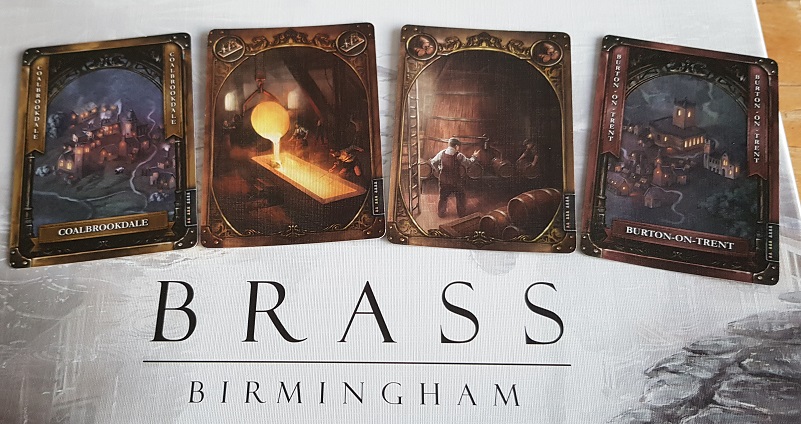
Facts
Published: 2018
Designers: Gavan Brown, Matt Tolman, Martin Wallace
Players: 2-4, works well with all player counts.
Playing time: 60-120 minutes, depending on player count.
Complexity: medium-heavy
Unboxing And Components
Expectations
I’ve got to admit that I haven’t played Lancashire, therefore I didn’t quite know what to expect with Birmingham. I knew that it was quite a highly rated and fairly complex resource management board game and that was about it.
With the currently popular trend of inflating complexity and game mechanics that designers manage to stuff in a single game (resulting in a ton of components, fiddly moving parts, and a long set-up), I was pleasantly surprised by the minimalism of Brass: Birmingham.
Components
It achieves a lot with (relatively) little. There’s the double-sided main playing board (with the back side behind purely cosmetic), 4 player boards, 180 building tokens, a deck of cards, and coins. That’s cardboard. On top of that, there are wooden tokens for coal, iron, and beer.
Artwork
The artwork on the boards and cards is nothing short of spectacular. Its crimson tones take you back 200 years without a problem. The boards sport a great overview, as well. Cities, buildings, and connections are all clearly seen on the main board, as well as the resources above them.
Personal boards feature all the possible buildings with costs and prizes, making it easy to see which you should focus on, which to skip (use the develop action), and what it will cost to build.
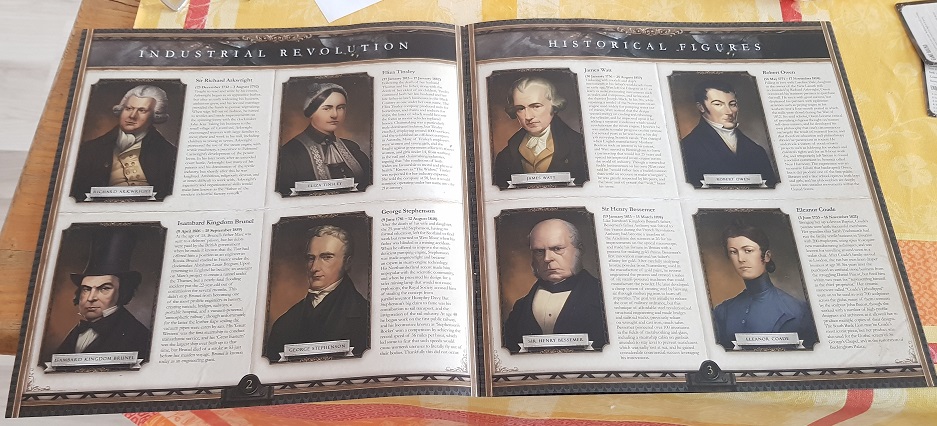
Rulebook, Learning, and Teaching Brass: Birmingham
The rulebook was thinner than expected. It’s only 12 pages long, with large text and plenty of illustrations. It’s very well written, everything is in its place, and easy to understand.
Some concepts are reiterated multiple times (i.e. discarding a card for every action) which makes them much easier to grasp. Moreover, it comes with basic strategy tips and things to remember, making Brass: Birmingham surprisingly straightforward to learn.
Teaching others is easy as well. Most of the rules are simple and explicit, making them very easy to understand. Some concepts (like resource connections) take some more time to grasp, but when playing, it all flows naturally.
The complexity of Brass is not in remembering a hundred fiddly rules, but rather in strategy and player decisions. While you can share basic tips with newbies, eventually it’s up to every individual to figure it out. Brass: Birmingham is one of that easy-to-learn, but hard-to-master titles.
How To Teach Brass: Birmingham To New Players? (6 Steps)
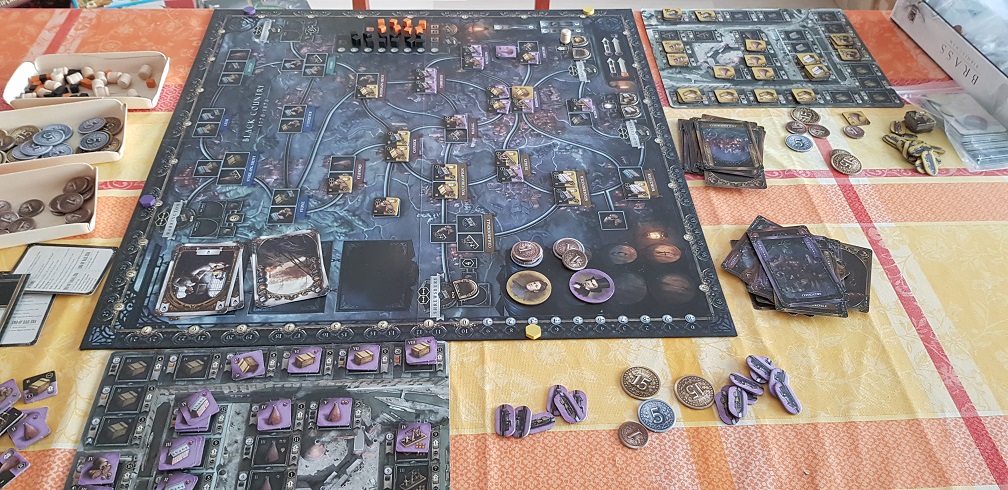
Setup
As already mentioned, Brass: Birmingham achieves a lot while not being bloated by components.
Therefore, the setup is relatively short, particularly the main board. The only tedious part is the player board, which requires each player to place his 45 building tokens on his.
But despite this, the game is still ready in a couple of minutes and the setup was never a problem for us.
How to play Brass: Birmingham
Discard a card and select an action
Brass: Birmingham’s main mechanic is action selection. This means that each turn, you will choose two actions from the available: build, expand your network, take a loan, sell buildings, develop your board, or draw wild cards.
Each action requires you to discard a card. While building requires you to discard a specific card, other actions don’t. Therefore, the deck is more of a timer, than anything else, although you must take care not to discard the cards you might need in the future.
Flipping building tiles
The building tiles you place on the board are the main way of earning points. But they don’t score in their prime form. No, the tile must be flipped to the scoring side. For coal mines, iron mines, and breweries, this happens when the resources on them are spent. On the other hand, factories, potteries, and cotton mills must be sold to merchants.
Resources
There’s only one resource in your possession – money. Other resources (coal, iron, and beer) are placed on the board (when an appropriate building is built) and are available to all players.
Coal and iron are required to construct most buildings and beer is needed when selling them to merchants. It’s preferable to spend your own resources since that makes your buildings faster to flip, but it’s not necessary.
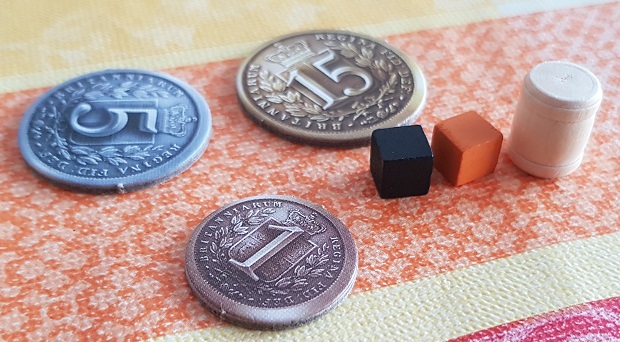
Keeping cities connected
The other way to earn points is through city connections. You start with canals and you can build railroads later. Connections are scored as per how many buildings they connect (regardless of the owner), which makes them very lucrative.
Moreover, several actions (building, further expanding connections, hauling certain resources) require the locations to be connected, so you definitely want to link up your industries. If you don’t, an opponent will, and he’ll take the spoils (victory points).
Scoring
The players go through the main deck twice (canal and rail era). After the canal era, buildings and connections are scored and partially removed from the board. Then, after rail real, both are scored again.
Review – My Thoughts on Brass: Birmingham
Just to confirm. Brass: Birmingham is a fantastically good board game. It’s rightfully at the top of all-time board games on BGG and it’s one of the best (if not the best) competitive euro games you can get. Let’s take a closer look at some of its stand-out points.
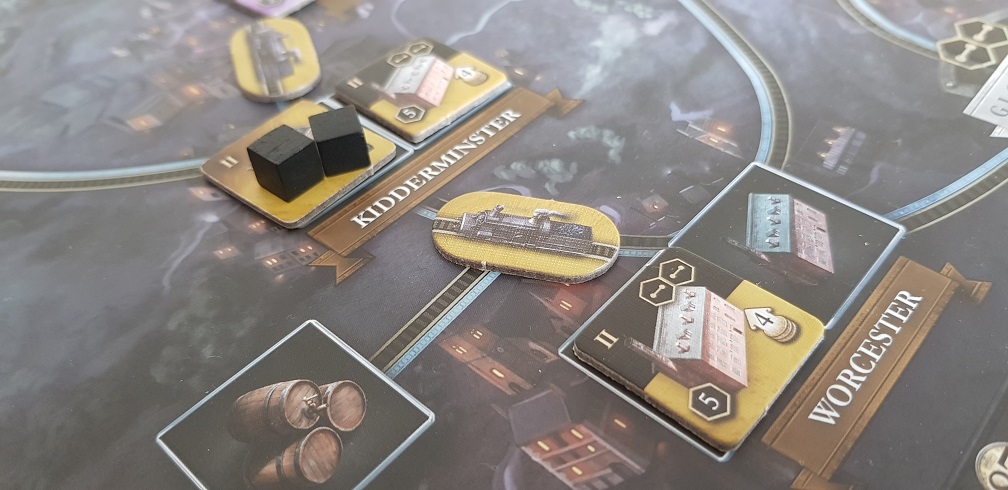
Scalability
It has great scalability. Although it’s more fun (because of the added interaction and competition) with 3 or 4 players, it’s still excellent at two. Lower player counts are played with fewer cards in the deck (the northern towns are taken out), which retains the focus around Birmingham and the tight play around it.
The northern part of the map is not closed though – you can still build there, although, without dedicated location cards, it’s much much harder. But not impossible, which I think is an excellent solution.
There’s a small downtime issue with 4 players, but when players have a few games under their belts and start planning in advance, it pales away. Overall the game plays exceptionally smoothly for a game of such strategic complexity.
The turns move swiftly and soon it’s the end of the canal era, the end of the rail era, and the end of the game. A two-player game can be finished in less than an hour.
Handling resources
I love the unique approach to how the resources are handled (they are available to all, spending other people’s resources, making connections), introducing interesting interaction among players. You must plan ahead whose resources you’ll consume. Build another mine to have your own coal, or use the one from your neighbor?
If nothing else is available, you can buy from the common market, which features elegant supply/demand mechanics. Each resource you buy is more expensive, but if you build a mine for a resource in demand, you immediately sell it back to the market. That way you earn a bit of cash and your mine is closer to flipping to its scoring side.
The game is all about Birmingham
Birmingham is the largest city on the map (the only one with 4 building slots) and how the gameplay revolves around it, it’s justifiably in the title name. It’s a centrally located hub, with many possible connections and resources pouring in (very thematic and historically accurate).
As such, it has great scoring potential, from both the buildings and the surrounding connections. Whoever controls the Birmingham area is one step towards victory, which of course makes it a highly contested area among the players.
All this results in a high level of interactivity between the players. Although very little is direct, this is not a multiplayer solitaire. It matters what others are doing.
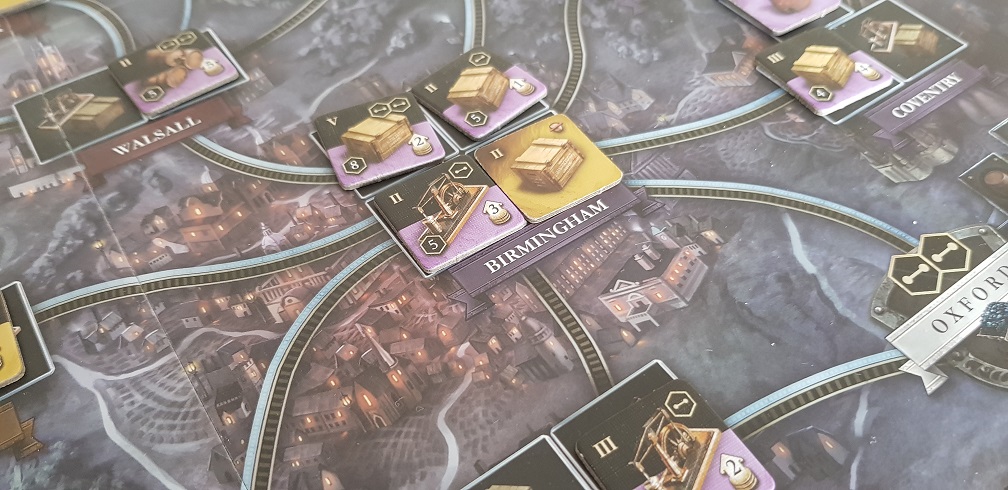
Plenty of strategic options
Brass: Birmingham accomplishes a lot of strategic complexity with simple initial inputs (straightforward actions, simplified loans, only money as a personal resource). While your initial strategy will depend on the hand you’re dealt (dictating which are and which building you’ll build), you’ll soon have to adapt.
Instead of building and then producing enough resources to flip those buildings, other opportunities will arise. Contentions for merchant points, resources, building slots, and connections will make you change your pace and adapt your plans.
You’ll always have plenty of options on your turn, even without changing your strategy much. Will you build a mine first and then build a brewery, or vice-versa? Whose resources do you want to consume? Sell buildings now, or build some more and then bulk-sell, saving an action – but risking running out of beer.
Clever game design
Even if you push into one direction too hard, there are in-build mechanisms that ensure the game moves smoothly onwards. Two examples.
It makes perfect sense to complete all your buildings and then flip them in one big sale at the end of an era. But that would be a pretty dull game arch.
Instead, Brass: Birmingham prevents this with merchant bonuses (+free beer!) for the first player to sell at a certain merchant. This makes selling about a balance of being the first or waiting out. Neither is correct or wrong – you’ll do both at some point.
Another situation is in the instance the resources run out in the market. In such a case it’s allowed to overbuild a mine on your opponent’s tile, just to be sure the resource is back in circulation and the game can continue.
Two eras with noticeably different paces
I like the way the pace picks up in the rail era. Suddenly, you’re allowed to stack more industries in the same city and you can build longer connections. This requires you to consume much more coal, making it the main fuel behind the industrial revolution. How thematically appropriate.
High replay value despite relatively low variability
I found Brass: Birmingham to be exceptionally replayable. I just want to play again and again. The games feel reasonably different from one to another to not feel stale. Variability comes from the cards you are dealt and how the merchants are randomly positioned. This dictates where you spread and what you build.
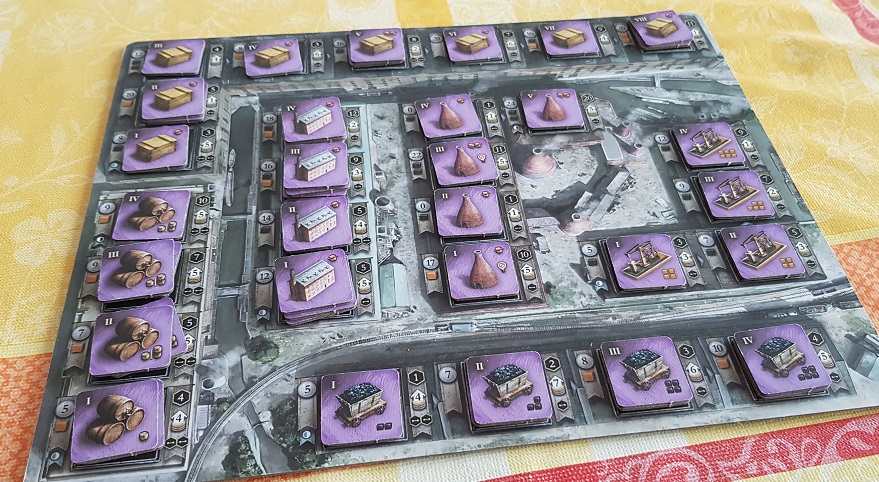
More maps? Maybe?
Although the board is double-sided, the map layout on both sides is the same, which is a waste of potential, in my opinion. I’m not saying the game suffers from a lack of variability and that it needs another map, but it surely wouldn’t hurt.
Perhaps something similar, but still different. Somewhere in Western Europe or the USA with slightly altered resource distribution and more paths to victory?
Solo mode
Unfortunately, there’s no official solo mode in the box. That’s a shame since the interaction mechanic is perfect to play against a well-designed AI. Luckily, fans came to the rescue and there are several fan-made solo modes available.
I’ve tried the Mautoma version and I can confirm it is phenomenal. AI’s play is almost indistinguishable from a human, the difficulty is scalable, and the upkeep is minimal. It does require you to print a deck of cards though – or you can use an online alternative.
The pricing
One last thing to mention is that Brass: Birmingham is not a cheap board game. Particularly if you just look at what you get in the box and compare it to other games of similar price or similar box contents.
In the end, gameplay-wise, it’s definitely worth the money, but the initial steep price might prevent some people from playing. People who would otherwise enjoy it.
Verdict
Brass: Birmingham is very very good. I can wholeheartedly recommend it to anyone.
You may have noticed that I haven’t particularly talked about the theme throughout the article. But that is not because of the lack of it. On contrary, the theme oozes through every board and every illustration.
More importantly, it’s interwoven into game mechanics, with your actions feeling thematic. If you are even remotely fond of the Industrial revolution, you will feel it at every moment of playing Brass: Birmingham.
A review copy has been donated by Roxley Games.
Read more:
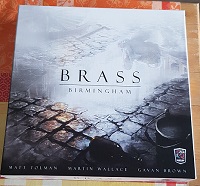
Pity there’s no review in here, just listing of superficial attributes.
What kind of mindspace does the game shape for players? What’s the interaction space? What’s the primarily mode of engagement with the game – in comparison to original Brass or modern euros in general. So, you know, I’d like some contextualisation and/or analysis for something to be called a review (and then a evaluation based on that).
Also – thematic – in what way does theme matter for the main engagement of the game. In contrast for instance with Arkham Horror or Tales of Arabian Nights? Can a player ignore the theme and still do well – and if yes, what does this mean about the level of theme integration?
Thanks for your reply and you do raise some very good points.
However, I believe that the analysis you’d like to read about is beyond the scope of a review (which is an overview of what the game is about, what you get, what are the main mechanics, things I liked/didn’t like, recommendation, and similar).
A follow-up article, discussing game meta in more detail is perhaps in order but after many more plays than what I’ve done so far (6). Be patient. 🙂